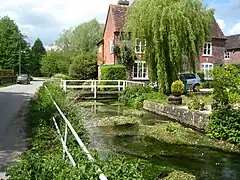Portal:Berkshire
Welcome to the Berkshire portal
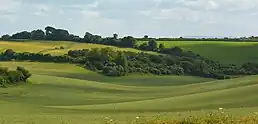
The Royal County of Berkshire, more commonly known as simply Berkshire (/ˈbɑːrkʃɪər, -ʃər/ ⓘ BARK-sheer, -shər; abbreviated Berks.), is a ceremonial county in South East England. It is bordered by Oxfordshire to the north and the north-west, Buckinghamshire to the north-east, Greater London to the east, Surrey to the southeast, Hampshire to the south and the south-west, and Wiltshire to the west. Reading is the largest settlement and the county town.
The county has an area of 1,262 km2 (487 sq mi) and a population of 911,403. The latter is concentrated in the east, the area closest to Greater London, and includes the county's largest towns: Reading (174,224) Slough (164,793), Bracknell (113,205), and Maidenhead (70,374). The west is rural, and its largest town is Newbury (33,841). Berkshire contains six Unitary Authority Areas: Bracknell Forest, Reading, Slough, West Berkshire, Windsor and Maidenhead, and Wokingham. The historic county included the parts of Oxfordshire south of the River Thames, which formed its northern border, but excludes Caversham and Slough.
The Berkshire Downs, a chalk downland and area of outstanding natural beauty, occupy the west of the county. They are the source of the River Kennet, which flows east through Newbury before meeting the Thames at Reading. The Thames then forms Berkshire's northern border, flowing past Maidenhead, before entering the county and flowing past Slough and Windsor. The south-east of the county contains Swinley Forest, a remnant of Windsor Forest now used as a forestry plantation.
There is evidence of prehistoric settlement on the Berkshire Downs, including the Iron Age Uffington White Horse, now in Oxfordshire. In the Anglo-Saxon period the region was contested by Mercia and Wessex, and Alfred the Great was born in Wantage, also now in Oxfordshire. Windsor Castle, which would become the official country residence of the British monarch, was built after the Norman Conquest. The county has been the site of several battles, particularly during the First English Civil War, when Reading and Wallingford were besieged and Newbury was the site of two battles, in 1643 and 1644. The east of the county's proximity to London led to development from the nineteenth century, when Slough became an industrial centre and Bracknell was designated a new town. Software development and high-tech industry dominate the economy in the east, but the west remains an agricultural region. (Full article...)
Selected article
The First Battle of Newbury was a battle of the First English Civil War that was fought on 20 September 1643 between a Royalist army, under the personal command of King Charles, and a Parliamentarian force led by the Earl of Essex. Following a year of Royalist successes in which they took Banbury, Oxford and Reading without conflict before storming Bristol, the Parliamentarians were left without an effective army in the west of England. When Charles laid siege to Gloucester, Parliament was forced to muster a force under Essex with which to beat Charles' forces off. After a long march, Essex surprised the Royalists and forced them away from Gloucester before beginning a retreat to London. Charles rallied his forces and pursued Essex, overtaking the Parliamentarian army at Newbury and forcing them to march past the Royalist force to continue their retreat.
Essex reacted by making a surprise attack on the Royalist lines at dawn, capturing several pieces of high ground and leaving Charles on the back foot. A series of Royalist attacks led to a large number of casualties and the slow retreat of Essex's force, which was driven from the central hill and almost encircled; Essex succeeded in rallying his infantry, however, and pushed forward in a counter-attack. The slowing of this counter-attack in the face of the Royalist cavalry forced Essex to send for reinforcements, who, while marching to him, were attacked and forced to retreat. This left a hole in the Parliamentarian line, dividing the army into two wings through which the Royalists hoped to pass, splitting the Parliamentarians and allowing Charles's troops to encircle and defeat them. In line with this, the Royalists moved forward to press the attack, but were forced to halt by the London Trained Bands. With night falling, the battle ended, and both exhausted armies disengaged. The next morning, low on ammunition, the Royalists were forced to allow Essex to pass and continue his retreat to London.
Reasons for the Royalist failure to defeat the Parliamentarians include shortage of ammunition, the relative lack of professionalism of their soldiers and the tactics of Essex, who compensated "for his much lamented paucity of cavalry by tactical ingenuity and firepower", countering Prince Rupert's cavalry by driving them off with mass infantry formations. Although the numbers of casualties were relatively small (1,300 Royalists and 1,200 Parliamentarians), historians who have studied the battle consider it to be one of the most crucial of the First English Civil War, marking the high point of the Royalist advance and leading to the signing of the Solemn League and Covenant, which brought the Scottish Covenanters into the war on the side of Parliament and led to the eventual victory of the Parliamentarian cause. (Full article...)
Selected biography
Nicholas Caradoc Hoult (born 7 December 1989) is an English actor. His filmography includes supporting work in big-budget mainstream productions and starring roles in independent projects in the American and British film industries. He has received several accolades, including nominations for a British Academy Film Award, two Golden Globe Awards, and a Primetime Emmy Award. He was included in Forbes 30 Under 30 in 2012.
Hoult performed in local theatre productions as a child. He made his screen debut in the 1996 film Intimate Relations after being cast at age five and later appeared in several television programmes between 1998 and 2001. His breakthrough came with his role in the 2002 comedy-drama About a Boy. He achieved wider recognition for his performance as Tony Stonem in the E4 teen series Skins (2007–2008). His transition to adult roles began with the 2009 drama A Single Man, for which he earned a BAFTA Rising Star Award nomination, and the fantasy film Clash of the Titans (2010). He played the mutant Hank McCoy in the 2011 superhero film X-Men: First Class, a role he reprised in later instalments of the film series.
Hoult played the titular Jack in the fantasy adventure film Jack the Giant Slayer (2013) and a zombie in the romantic comedy Warm Bodies (2013). He had a supporting role in the action film Mad Max: Fury Road (2015) and starred in a number of independent films before portraying various historical figures such as Robert Harley in the black comedy The Favourite (2018), writer J. R. R. Tolkien in Tolkien (2019), and Peter III in the Hulu comedy-drama series The Great (2020–2023). His work on the latter earned him nominations for two Golden Globe Awards and a Primetime Emmy Award. He has since starred in the horror comedies The Menu (2022) and Renfield (2023).
Outside of film, Hoult voiced Elliot in the 2010 action role-playing game Fable III and appeared in the 2009 West End play New Boy. He supports the charitable organisations Teenage Cancer Trust and Christian Aid. (Full article...)
Topics
History: Battle of Reading (871) • Battle of Reading (1688) • First Battle of Newbury • Second Battle of Newbury • Siege of Reading
Geography: River Thames • Swinley Forest • The Ridgeway • Walbury Hill • Windsor Great Park
Towns: Ascot • Bracknell • Crowthorne • Earley • Eton • Hungerford • Maidenhead • Newbury • Reading • Sandhurst • Slough • Thatcham • Windsor • Wokingham • Woodley
Politics: Parliamentary constituencies • Parliamentary representation
Culture: Henley Royal Regatta • Museum of English Rural Life • Reading festival • Windsor Castle
Selected pictures
Did you know
- ... that Herbert James Gunn used a paper cut-out of Princess Elizabeth's corgi dog to help him paint his Conversation Piece at the Royal Lodge, Windsor?
- ... that three gasholders at the Windsor Street Gasworks were painted in the claret and blue colours of local football team Aston Villa?
- ... that today's funeral procession of Elizabeth II to Windsor Castle started at the gate to Shaw Farm?
- ... that when Queen Anne became too infirm to follow her pack of Buckhounds on horseback, she had paths cut through Windsor Forest so she could follow the hunt in a carriage?
- ... that the Jubilate by Benjamin Britten was written in 1961 for St George's Chapel at the request of the Duke of Edinburgh, and performed there for some of his birthdays and his funeral?
- ... that the cooking of Flora Mae Hunter was enjoyed so much by the Duchess of Windsor that she gained weight on her visits to the plantation where Hunter worked?
Categories
Related portals
WikiProjects
- WikiProject Berkshire
- WikiProject England
Wikimedia
The following Wikimedia Foundation sister projects provide more on this subject:
-
 Commons
Commons
Free media repository -
 Wikibooks
Wikibooks
Free textbooks and manuals -
 Wikidata
Wikidata
Free knowledge base -
 Wikinews
Wikinews
Free-content news -
 Wikiquote
Wikiquote
Collection of quotations -
 Wikisource
Wikisource
Free-content library -
 Wikiversity
Wikiversity
Free learning tools -
 Wikivoyage
Wikivoyage
Free travel guide -
 Wiktionary
Wiktionary
Dictionary and thesaurus
-
 List of all portalsList of all portals
List of all portalsList of all portals -
 The arts portal
The arts portal -
 Biography portal
Biography portal -
 Current events portal
Current events portal -
 Geography portal
Geography portal -
 History portal
History portal -
 Mathematics portal
Mathematics portal -
 Science portal
Science portal -
 Society portal
Society portal -
 Technology portal
Technology portal -
 Random portalRandom portal
Random portalRandom portal -
 WikiProject PortalsWikiProject Portals
WikiProject PortalsWikiProject Portals

.jpg.webp)


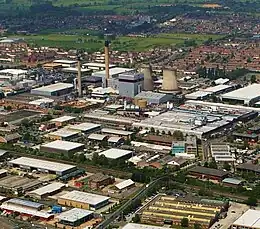
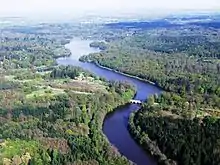
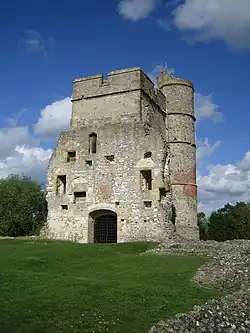
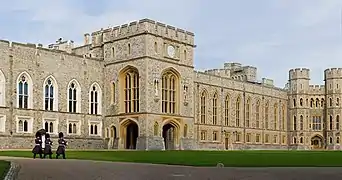
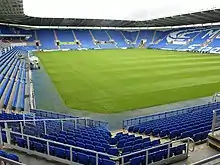
_male_Swinley.jpg.webp)

